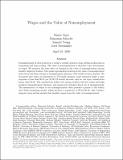Wages and the Value of Nonemployment*
Author(s)
Jäger, Simon; Schoefer, Benjamin; Young, Samuel; Zweimüller, Josef
DownloadAccepted version (6.121Mb)
Open Access Policy
Open Access Policy
Creative Commons Attribution-Noncommercial-Share Alike
Terms of use
Metadata
Show full item recordAbstract
<jats:title>Abstract</jats:title>
<jats:p>Nonemployment is often posited as a worker’s outside option in wage-setting models such as bargaining and wage posting. The value of nonemployment is therefore a key determinant of wages. We measure the wage effect of changes in the value of nonemployment among initially employed workers. Our quasi-experimental variation in the value of nonemployment arises from four large reforms of unemployment insurance (UI) benefit levels in Austria. We document that wages are insensitive to UI benefit changes: point estimates imply a wage response of less than $0.01 per $1.00 UI benefit increase, and we can reject sensitivities larger than $0.03. The insensitivity holds even among workers with low wages and high predicted unemployment duration, and among job switchers hired out of unemployment. The insensitivity of wages to the nonemployment value presents a puzzle to the widely used Nash bargaining model, which predicts a sensitivity of $0.24–$0.48. Our evidence supports wage-setting models that insulate wages from the value of nonemployment.</jats:p>
Date issued
2020Department
Massachusetts Institute of Technology. Department of EconomicsJournal
Quarterly Journal of Economics
Publisher
Oxford University Press (OUP)